Figuring out how much money you need for retirement is like one of those word problems from high school that you’re still haunted by. It’s not an impossible equation to solve, but it won’t be a precise calculation. You should look at your retirement strategy at least once or twice a year to make sure you’re on the right track, and you should be ready to make adjustments if it isn’t. If you’re behind on your goals, there’s no need to worry because you can always catch up. But it’s important to take action.

Factors That Can Affect Your Retirement Planning
There is no “one size fits all” approach to retirement planning, and there are a number of factors that can determine how much you need for retirement. Some of them include the following:
- How long you will live — No one knows the answer to this question, but it’s still a good idea to look at some statistics. The average man who is 65 years old can expect to live 18.8 more years (which is almost to age 84), while the average woman of the same age can expect to live past her 86th birthday.
- When you plan to retire — This can have major impact on how much you need to save. The more you can postpone your retirement, the less you’ll need to save. Delaying your retirement can give your savings more time to grow. You’ll also have fewer years in retirement (in addition to more Social Security benefits).
- How you want to live when you retire — Do you believe your expenses will go down when you retire (what’s referred to as a “below average lifestyle”), or do you plan to spend as much as you do now (what’s considered to be “average”)? If you believe your expenses will be more than what they are now, it would be considered “above average.”
- How much you will earn on your savings — No one knows how stocks, bonds, or certificates of deposit will perform in the next 20 years. Financial advisors often recommend caution when you’re estimating your portfolio returns. You should shoot for a 2.5% return after inflation, which would be about 5.5% today.
You should plan to save between 10% and 15% of your annual pretax income for retirement. But if you have a 401(k) or any other employer-sponsored retirement account and your employer matches your contributions, it can reduce the amount you need to save. It’s usually a good idea to contribute at least enough money to an employer-sponsored retirement plan to qualify for a full employer match.
Retirement Planning for Your Desired Lifestyle
You need to ask yourself what type of lifestyle you want to have when you retire. Do you want to travel the world, join a private country club, eat out at fancy restaurants, and participate in expensive hobbies? You may prefer to stay at home and live a more frugal lifestyle. Knowing the answer to these questions will go a long way in determining how much money you’ll need in your nest egg when you decide to retire.
You must also ask yourself where you want to live during your retirement years. You’ll need more retirement savings if you’re going to live in a city with a high cost of living instead of in a small rural area that isn’t as expensive. You should plan on needing between 70% and 80% of your pre-retirement income once you have retired, and you should consider the possibility of not having certain expenses that are often associated with working (such as commuting, purchasing work clothes, and eating out for lunch).
Retirement Planning and Social Security
You need to look at how much retirement income you may get from other sources besides your savings, which can include Social Security. You can get a current estimate of what your Social Security benefits could be at retirement by creating a personal Social Security account, but it’s only an estimate based on current law. So, there’s no guarantee that you’ll get that amount when you reach retirement age.
The Social Security Administration estimates that by 2033, the amount of payroll taxes being collected to fund Social Security will only be able to pay 79% of the scheduled benefits. But Social Security benefits aren’t meant to be your only source of retirement income. According to the Social Security Administration, it will only replace approximately 40% of the pre-retirement earnings of the average American.
If you’re looking for a CPA in Corpus Christi that can help you plan for retirement, be sure to reach out to Jennings Hawley & Co.
